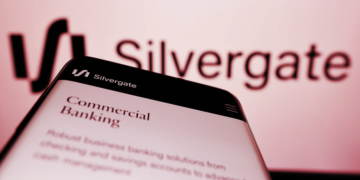
I got banned from Midjourney AI for generating realistic images of politicians cheating on their wives for a series called “AI will revolutionize the blackmail industry”
A couple thoughts on AI images from someone who’s good at making fake stuff 🧵
Trump cheating on his wife: pic.twitter.com/HjxBj7qdaR
— JustinTBrown (@JuuustinBrown) May 26, 2023
Bernie, noo 😭
I think you’re right about the dangers. GOP already used AI in an ad. Not as blackmail, but shows AI can be used for quick ops. Best if social media had universal moderation against misinformation & verified accounts for all reputable press, govt orgs, pols.
— Patrick Scott Bruck See 📌 to help our family! (@PatrickSBruck) May 26, 2023
Stay on top of crypto news, get daily updates in your inbox.
- SEO Powered Content & PR Distribution. Get Amplified Today.
- PlatoData.Network Vertical Generative Ai. Empower Yourself. Access Here.
- PlatoAiStream. Web3 Intelligence. Knowledge Amplified. Access Here.
- PlatoESG. Automotive / EVs, Carbon, CleanTech, Energy, Environment, Solar, Waste Management. Access Here.
- BlockOffsets. Modernizing Environmental Offset Ownership. Access Here.
- Source: https://decrypt.co/147238/political-satirist-slammed-for-creating-deepfakes-of-trump-biden-cheating-on-their-wives
- :has
- :is
- :not
- 11
- 12
- 2024
- 26
- 8
- 9
- a
- About
- Absolute
- accountability
- Accounts
- accuracy
- Action
- Ad
- After
- against
- age
- ahead
- AI
- ai art
- All
- allowed
- already
- also
- america
- an
- and
- Announcement
- Art
- artificial
- artificial intelligence
- AS
- aspiring
- At
- audience
- Bad
- Ban
- banned
- Bans
- Barack Obama
- BE
- become
- been
- before
- being
- BEST
- Better
- between
- biden
- Biggest
- Blackmail
- but
- by
- called
- came
- Campaign
- CAN
- candidate
- Cause
- Center
- certainty
- cheating
- claiming
- conceived
- Concern
- content
- continue
- controversial
- controversy
- Conversation
- conversely
- could
- Couple
- created
- Creating
- crypto
- Crypto News
- daily
- dangers
- Dark
- day
- de
- debate
- Decrypt
- deepfakes
- definitely
- digital
- digital age
- directly
- discourse
- disinformation
- do
- donald
- Donald Trump
- Earning
- editor
- elaborated
- Election
- Elon
- Elon Musk
- emotions
- engaged
- especially
- Ether (ETH)
- ethics
- existing
- express
- expressing
- fake
- fallout
- faster
- fictional
- Figures
- Fire
- First
- first time
- followed
- followers
- For
- found
- from
- further
- future
- gaining
- generate
- generated
- generating
- get
- getting
- goal
- good
- Govt
- had
- hand
- handle
- happen
- harmful
- Have
- he
- help
- high-profile
- his
- However
- HTML
- HTTPS
- i
- identify
- if
- images
- immediately
- Impact
- important
- in
- Indicator
- industry
- Influential
- ING
- Intelligence
- intent
- internal
- International
- into
- isn
- issue
- IT
- joe
- Joe Biden
- just
- Justin
- Kind
- largely
- Late
- leading
- Level
- like
- Line
- made
- Main
- Mainstream
- Making
- Market
- maybe
- Media
- MidJourney
- mind
- Misinformation
- mixed
- moderation
- months
- most
- Musk
- Need
- news
- next
- now
- Obama
- of
- on
- ONE
- or
- Other
- our
- out
- part
- party
- patrick
- People
- photoshop
- Pictures
- Pizza
- platform
- plato
- Plato Data Intelligence
- PlatoData
- political
- Politicians
- politics
- POLS
- possible
- posted
- potential
- president
- presidential
- presidential candidate
- presidential election
- press
- previously
- project
- prominent
- question
- Quick
- quickly
- raised
- RE
- realistic
- Reality
- regulations
- relative
- release
- remarkable
- remarked
- Removed
- Reported
- Republican
- reputable
- Revealed
- revealing
- revolutionize
- right
- Ring
- Riot
- RON
- Rumors
- s
- Said
- Sanction
- say
- scene
- scott
- see
- send
- Series
- Services
- Shop
- Shows
- single
- So
- Social
- social media
- some
- Someone
- something
- sparked
- spread
- stark
- start
- such
- SWIFT
- Swing
- tank
- team
- Technology
- than
- thanks
- that
- The
- their
- themselves
- There.
- Think
- this
- threats
- time
- to
- too
- top
- traction
- true
- trump
- u.s.
- under
- Universal
- Updates
- use
- used
- users
- verified
- verified accounts
- Video
- warning
- was
- we
- were
- which
- whirlpool
- whole
- wife
- will
- with
- words
- york
- you
- Your
- zephyrnet
More from Decrypt
DeFi Trading Platform FODL Giving Away $1M in Bored Ape Ethereum NFTs
Source Node: 1884152
Time Stamp: Feb 7, 2022
‘Dune’ NFTs Spark Backlash Over Ethereum’s Environmental Impact
Source Node: 1067363
Time Stamp: Sep 10, 2021
TikTok Mixes It Up With Ethereum, Taps Audius as First Music Streaming Partner
Source Node: 1028791
Time Stamp: Aug 16, 2021
Film Director Jim Cummings Is Auctioning His Thunder Road Script as an NFT
Source Node: 1057025
Time Stamp: Sep 3, 2021
What Will Hold Back Bitcoin Adoption in El Salvador? The Dollar, Says JP Morgan
Source Node: 975380
Time Stamp: Jul 12, 2021
Otherside: Legends of the Mara Open Beta Launching in September – Decrypt
Source Node: 2246653
Time Stamp: Aug 31, 2023
Growing List of Crypto Companies Cutting Silvergate Ties
Source Node: 1988182
Time Stamp: Mar 2, 2023
You Can Play Games Like ‘Doom’ on Bitcoin and Dogecoin—Here’s What That Means – Decrypt
Source Node: 2465862
Time Stamp: Feb 2, 2024
Swedish Fraudster Jailed 15 Years for $16 Million Crypto Con
Source Node: 971506
Time Stamp: Jul 9, 2021
Layer-1 Blockchains Solana, Cardano, Avalanche Down 8% Over the Week
Source Node: 1722189
Time Stamp: Oct 12, 2022












